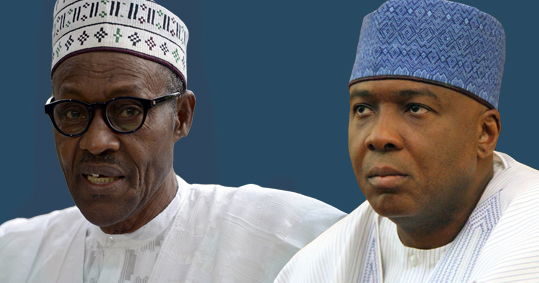
Nigeria’s Senate President, Bukola Saraki, many observers would agree, was uncharacteristically pointed yesterday as he addressed the nation’s upper house on the occasion of the one year anniversary of the 8th Senate.
Saraki spent the greater part of his address in trying to identify possible solutions to Nigeria’s daunting problems—the economy facing a terrible downturn, militancy threatening oil revenue from the Niger Delta and a general rise in unemployment level.
He said: “These are serious challenges that require all hands to be on deck. There is no other time in our history than now, when the business of government needs to be conducted with great inclusiveness. We must find a way to bring the best brains in our country on board wherever they may be found. Even those who did not vote for us but believe in the change that we all believe is necessary to move our country forward should be given a seat at the table. If we are able to mobilise the best human resources that God has bountifully blessed our country with, I have no doubt that with God on our side, we shall overcome.”
Dr Saraki regretted that the Senate had failed to take the steps needed, particularly, oversight, to ensure that there was performance by those appointed into public office. He said: “We are confident that one year after, the President must by now have better clarity on the capacity of his appointees. The Senate would not hesitate to hold any appointee accountable for the work he has accepted to do. We would like to seek Mr President’s support and co-operation to enable us discharge this oversight task.”
The Senate President was also pointed in his observation that poverty has become a major challenge among the masses of the people of Nigeria. He suggested that the President Muhammadu Buhari government takes poverty as a potent threat to the country and that the threat be tackled with utmost seriousness.
“While government has made progress in the fight against Boko Haram and the fight against corruption,” he said, “the fight against mass poverty remains a daunting challenge. Rising cost of living, increased cases of retrenchment and corresponding rise in unemployment, inability of state governors to pay salaries and upsurge in ethnic-based agitation potentially deny government the full credit of the great strides it has made in other areas.”

Kano High Court Affirms Suspension of APC’s Abdullahi Ganduje Pending Hearing
Governor Obaseki Appoints Omobayo Godwins As Deputy Governor
Edo State Deputy Governor Philip Shaibu Impeached By State House Of Assembly
NLC Protests At Labour Party Headquarters, Demands Chairman’s Resignation